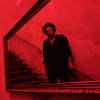The northeastern edge of Vancouver is populated with the homeless and addicted, men and women ambling down the street, sunken in doorways, or laying on the steps of buildings‚ bodies palsied from years of dependence, faces so marred with the pain of whatever demons they've been fighting that no one seems to be of any age in particular. It's a community that seems hopelessly lost and equally fascinating in its extremity, one begging the wide-eyed question, What happened here? Daniel Bejar, the principle mind behind the band Destroyer, makes this edge of the city his home and lives quietly in a strange beige house on a street called Princess Avenue. There is a gallery near his place that features the work of new artists every month; at the end of last year, the installation was a 15-foot silhouette of the grim reaper painted with the phrase, "Enjoy the Wait." Opposite the gallery is the clinic where many of the area's men and women line up for emergency food and shelter.
Bejar's house itself is a ramshackle place that has the dusty, exhilarating air of a sunken ship: pieces of walls are missing and reveal torn wallpaper from years ago, the crowded basement stores (among other things) the rusted remains of a very well stocked toolshop and old black and white photographs of the Chinese family that lived in the house some years ago. A few of the rooms upstairs are given over completely to the storage of chairs and boxes, donated furniture, mic stands and‚ buried somewhere in the back of all of it‚ Bejar's piano. It's not readily apparent how one would actually get close enough to play it. In some places, the floors are linoleum and in others they are hardwood. Bejar has a cat, and feeds her something called, "Chicken Soup For The Cat Lover's Soul" but other than that‚ and a few empty glass Gerolsteiner water bottles near the door‚ his is a largely unglamorous affair.
Despite all that, Destroyer‚ and for the purposes of this story‚ Bejar, makes dizzying, complex, spirit-rousing, bellicose and very precisely thought-about music that a lot of people have enjoyed calling glam rock but most people just call rock, though Bejar would probably shy away of getting specific about what exactly he makes. This spring, Bejar is releasing his seventh album, Destroyer's Rubies. "For the most part, it's kind of ambling‚ like more or less held-together afternoon rock," he says. "But I'm sure the band will hate that description."
In the last several years, most people who have known the name Daniel Bejar have associated it with supermusical explosion the New Pornographers, a band he co-founded with frontman/guitarist AC Newman and synth player Blaine Thurier. Though the Pornographers' latest album, Twin Cinema, features a few songs written by Bejar, they are old ones resurrected from the last decade‚ and while Bejar toured with and opened for the Pornographers recently, he says with a certain amount of finality, "It's not gonna happen again, that was a one-off." And, more importantly he says, "[The New Pornographers make] music I like, but you just have to listen to the last two records I've done and their last two records to realize the trajectory of the aesthetics are different and getting farther apart as the years go by."
Destroyer began ten years ago in Vancouver when Bejar dropped out of the University of British Columbia: "I'd wake up hungover and would just fuck around a little bit on my roommate's 4-track. It was really cool because I could make up songs that sounded like songs that I had records of, which is bad‚ but the novelty of that is pretty strong." As Destroyer, Bejar recorded his first album We'll Build Them A Golden Bridge, which he largely dismisses as a lot of mumbling and mimicry. In 1999, Bejar added a rhythm section and recorded the album City Of Daughters, which was the debut of the now-signature Destroyer vocals: Bejar's bright alto, which few can resist comparing to Bowie's‚ both in its sharp, plaintive declaration and sweeping crescendos. Thief, Destroyer's third album, was recorded in 2000. "For the hell of it," he says, "I thought I'd string together a loose concept about a critique of some version of the music industry. I have literally no experience with the music business‚ I just don't sell enough records. So Thief was 99 percent a work of fiction. Even then, it felt like in the college rock music industry, to give a shit about that stuff seemed so quaint, but I thought that was a good reason to try and do it." This approach to music-making using a wry, experimental idea‚ or, as Bejar puts it, "a preconceived overarching methodology to working"‚ is now a hallmark of Destroyer albums, though precisely what that organizing principle is, and how it affects the actual sound of the album, is completely unpredictable.
Released in 2001, Streethawk: A Seduction was Destroyer's fourth album, and the one that caught the eye of HMS Indie dreamboat label Merge Records, to which Destroyer signed in the spring of 2002. In many ways, the Destroyer story‚Äîin its most digestable and relevant form‚ begins with this album and the ones Bejar has recorded since. "Streethawk was the record where Destroyer was pegged as a glam rock band, which is kind of pretty absurd," says Bejar. "And when I first showed up in New York and played a string of shows, I was just like this kind of schlumpy guy, not dolled up like Ziggy Stardust. It was really anticlimactic for the handful of people who were into that record."
When I first showed up in New York and played a string of shows, I was just like this kind of schlumpy guy, not dolled up like Ziggy Stardust. It was really anticlimactic for the handful of people who were into that record.
Around this time, Bejar began to work with some of the musicians who would form Destroyer's now-permanent band: Scott Morgan on drums, Nicholas Bragg on guitar, Fisher Rose on vibes and Bejar himself composing and singing all the tracks (eventually, the band added Ted Bois on piano/keys and Tim Loewen on bass). Destroyer's following release, This Night, is a big record ("sprawling" is a favorite adjective for those writing about the band). Strands of poetry and confession are met with crashing, exultant choruses, scrambled guitar hooks, glissandi, and Bejar's own voice is overlaid atop of itself singing, crying, "Shoo be doo wop wop wop!" or "Do rah do rah do rah!" It is puzzling, arresting music.
The precursor to Destroyer's Rubies, an album titled Your Blues, was driven by Bejar's concept of Old Europe or what he calls, "Old Disappearing Europe" and a sinking feeling that the scene in America had gone from bad to a lot worse and that it was time to gain some distance from it. On the album, Bejar decries the American rock tradition and subsequently circumvents it, largely through the use of '80s cornball/gearhead favored MIDI technology. "I thought it was an interesting idea for someone with my voice to make a crooner record," he explains. "And obviously, I couldn't afford Nelson Riddle, so we got out the sound module." Though Bejar had worked with a number of different musicians to create the Destroyer sound, for Your Blues, he brought in Canadian "spazz" rockers Frog Eyes to tour and play on the album. "Things that exist outside of a rock tradition, I desperately try to latch on to, even though I fail," Bejar explains. "There's some production on the later Leonard Cohen records that is so repellent to American audiences, but for some reason I'm really fascinated by it. It's so canned but in a very tangible, human way."
And while the unabashed cheesiness is pretty extraordinary, (the MIDI synths really do swell with abandon) Your Blues proves the point that Destroyer is driven largely by a fascination with the things that we've lost somewhere along the way, whether through marginalization or expiration or lapsed faith.
With the Italian production techniques and the spazz rockers covering songs inspired by out-of-work Shakespearean actors that seem just to the left of Totally Screwball, it's apparent that Bejar is equally inquisitive about things that are trite and overwrought, yet his inclusion of the uglier elements isn't driven by a sense of irony or sneering intellectualism. Instead, his curiosity seems to come from a genuine, somewhat madcap impulse to see how those things would sound if filtered through the Destroyer industrial complex. During the course of our interview, Bejar mentioned some of the harebrained ideas that had, at one point, been legitimate questions: What if we had MIDI congas? Could we have backup singers, like the ones from "Walk On The Wild Side"? What about driving this thing really far into Steely Dan territory? Bejar insists that he chickens out most of the time, but you find the fingerprints of these ideas in the layers of Bejar's own falsetto that sound almost like he could be singing back up for Lou Reed. Or when he forces his drummer to hop on the sax and dig into it, even though "he couldn't really rattle off any Ornette Coleman kind of stuff."
The elements Bejar does fully incorporate are chosen for specific reasons. As he explains, "Glam rock is pretty handy for composing anthems, and all the dressing the nation of your peers and saying, Don't do this, don't do that,' or‚ This is a fucked-up situation, look at this.' That's a pretty fun stance to take when you know no one's gonna hear your record." Among the ideas that lay in the foundations of Destroyer's Rubies are the loose concepts of old men making music and '70s, piano-heavy, sing-along bar bands. With an opening title track that runs nearly ten minutes long, and a closing song that channels Van Morrison and pushes the band into a nearly two-minute, album-finishing "bottom-heavy funk" that no one‚ including the band, it can be safely assumed‚ seems to be able wrap their head around, you'd have to guess that it's a really fucking drunk bunch of old guys making the music that Bejar is talking about. But somehow, it works. Destroyer's Rubies takes Bejar's ankles-on-the-table meditations and transmogrifies them into some incredibly harmonious music‚ perhaps his most melodic yet‚ though the songs never forget their source, and bear fruit in lyric form with lines like I was just another West Coast maximalist exploring the blues/ Ignoring the news/ From the front. Then again, there are also lines like All good things must come to an end/ The bad ones just go on forever.
Not surprisingly, somewhere in the last five years there developed what Bejar terms, "the cabal of bloggers" who spend an inordinate amount of time discussing either the minutiae or the heart of Destroyer's music, depending on who you talk to. Thief, with its ready footholds of industry bullshit and corruption was ripe for indie analyses, and Streethawk, with its spark of glam rock-inspired gender politicking ("There's a lot of theory and dialogue about artifice and gender and the whole Velvet Goldmine/Todd Haynes version of glam rock," says Bejar), made good fodder for message boards and the few music critics who had enough space to actually write about what Bejar was saying. Or at least what they thought he was saying.
I'm aware of how potentially dangerous and kind of Lizard King it feels. But I'm not too scared, just get a couple of beers in me and I'll do that.
Where Destroyer's music is a stylized version of lost treasure, the lyrics that accompany his aural spelunking magnify this to impossible dimensions. Much of Bejar's writing has the cadence and complexity of poetry, something he says he doesn't read but is trying to. "As David Berman said, I think it improves your game,'" he says. Archpoetic delivery, though, can be a slippery slope, and Bejar is "aware of how potentially dangerous and kind of Lizard King it feels. But I'm not too scared, just get a couple of beers in me and I'll do that."
Bejar's compositions are wobbly, illustrative pastiches that often involve imaginary women (on Rubies he mentions Candice, Molly, Clytemnestra, Ruby and Christine), references to his own albums and songs, strands of lines from pop anthems and lots of references to crumbling empires. Someone in the cabal‚ or someone just aware of it‚ invented a Destroyer drinking game based on the idiosyncrasies of Bejar's lyrics, a hangover-inducing process that involves drinking whenever there's the "use of an archaic or ostentatiously formal or foreign-language term, etc." There's a thread of kinship between Destroyer's verbal hat tricks and the twisted operettas of the Fiery Furnaces or the musical theatricality of the Magnetic Fields, but to draw more than a dotted line would be to ignore the fact that at the heart of his music, Bejar is driven by an incredibly romantic wistfulness that works in perfect tandem with his plainly emotional chords and choruses. His songs aren't stories in the same way that both the Friedbergers and Stephin Merritt tell tall tales: "I can't write in a narrative mode at all," says Bejar. "I can't string a 4-minute country song together about what happens to Poncho." Though Bejar himself would argue that music trumps vocals every time, it's the cumulative effect of Destroyer's vocals heralding When I'm at war/ I insist on slaughter/ And getting it on/ With the hangman's daughter/ She needs release/ She needs to feel at peace/ With her father/ The fucking maniac! followed by a devastating, wailing fuzz guitar held aloft by vicious chords pounded out on the piano that makes anybody who is listening just simply want to fall down, like so many of the buildings and artifices and empires that Bejar has eulogized.
Somewhere in the middle of his interview, Bejar says, "Music, or being in a band, seemed embarrassing, gauche, totally exhibitionist, hack‚ it just didn't seem respectful to me. Part of me still feels like I might as well be an actor," and this attitude seems to draw him back from the flame every so often, like Maybe we shouldn't really push those synths that far or, more fundamentally, as he gets older, Does rock music at some point become embarrassing? It's probably not necessarily sad to him that most people might not get it, and that he himself sort of fucks it up from time to time. The failures and missteps, after all, are part of the poetry.





